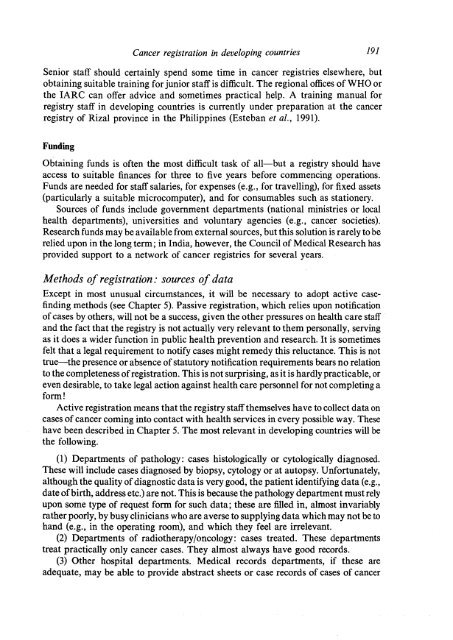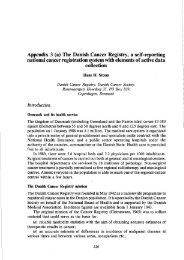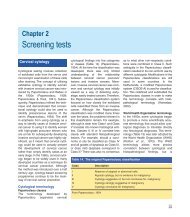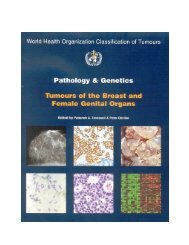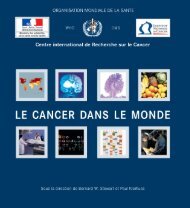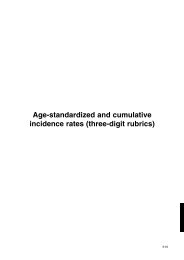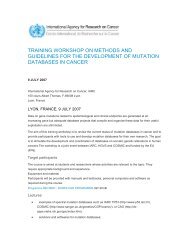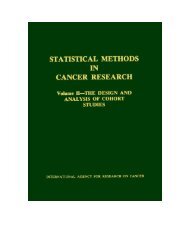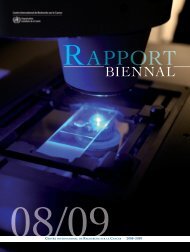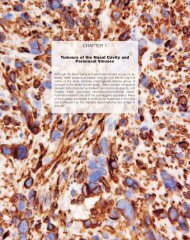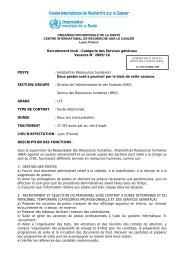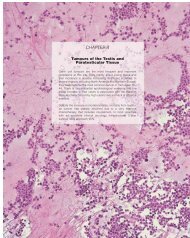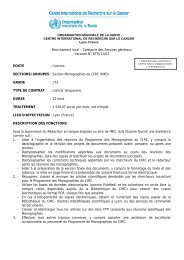Cancer Registration: Principles and Methods - IARC
Cancer Registration: Principles and Methods - IARC
Cancer Registration: Principles and Methods - IARC
You also want an ePaper? Increase the reach of your titles
YUMPU automatically turns print PDFs into web optimized ePapers that Google loves.
<strong>Cancer</strong> registration in developing countries 191<br />
Senior staff should certainly spend some time in cancer registries elsewhere, but<br />
obtaining suitable training for junior staff is difficult. The regional offices of WHO or<br />
the <strong>IARC</strong> can offer advice <strong>and</strong> sometimes practical help. A training manual for<br />
registry staff in developing countries is currently under preparation at the cancer<br />
registry of Rizal province in the Philippines (Esteban et al., 1991).<br />
Funding<br />
Obtaining funds is often the most difficult task of all-but a registry should have<br />
access to suitable finances for three to five years before commencing operations.<br />
Funds are needed for staff salaries, for expenses (e.g., for travelling), for fixed assets<br />
(particularly a suitable microcomputer), <strong>and</strong> for consumables such as stationery.<br />
Sources of funds include government departments (national ministries or local<br />
health departments), universities <strong>and</strong> voluntary agencies (e.g., cancer societies).<br />
Research funds may be available from external sources, but this solution is rarely to be<br />
relied upon in the long ternl; in India, however, the Council of Medical Research has<br />
provided support to a network of cancer registries for several years.<br />
<strong>Methods</strong> of registration : sources of data<br />
Except in most unusual circumstances, it will be necessary to adopt active casefinding<br />
methods (see Chapter 5). Passive registration, which relies upon notification<br />
of cases by others, will not be a success, given the other pressures on health care staff<br />
<strong>and</strong> the fact that the registry is not actually very relevant to them personally, serving<br />
as it does a wider function in public health prevention <strong>and</strong> research. It is sometimes<br />
felt that a legal requirement to notify cases might remedy this reluctance. This is not<br />
true-the presence or absence of statutory notification requirements bears no relation<br />
to the completeness of registration. This is not surprising, as it is hardly practicable, or<br />
even desirable, to take legal action against health care personnel for not completing a<br />
form !<br />
Active registration means that the registry staff themselves have to collect data on<br />
cases of cancer coming into contact with health services in every possible way. These<br />
have been described in Chapter 5. The most relevant in developing countries will be<br />
the following.<br />
(1) Departments of pathology: cases histologically or cytologically diagnosed.<br />
These will include cases diagnosed by biopsy, cytology or at autopsy. Unfortunately,<br />
although the quality of diagnostic data is very good, the patient identifying data (e.g.,<br />
date of birth, address etc.) are not. This is because the pathology department must rely<br />
upon some type of request form for such data; these are iilled in, almost invariably<br />
rather poorly, by busy clinicians who are averse to supplying data which may not be to<br />
h<strong>and</strong> (e.g., in the operating room), <strong>and</strong> which they feel are irrelevant.<br />
(2) Departments of radiotherapyloncology: cases treated. These departments<br />
treat practically only cancer cases. They almost always have good records.<br />
(3) Other hospital departments. Medical records departments, if these are<br />
adequate, may be able to provide abstract sheets or case records of cases of cancer


